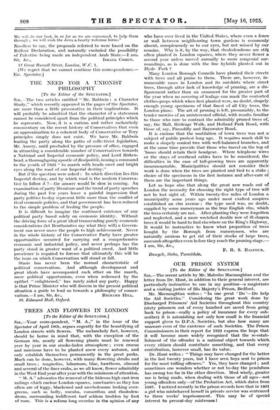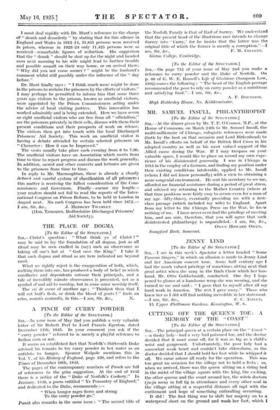OUR PRISON SYSTEM
.[To the Editor of the SPECTATOR.] SIR,—The recent article by Mr. Malcolm Macnaughtan and the letter from Dr. Hunt, in addition to their general interest, are particularly instructive to one in my position—a magistrate and a visiting justice of His Majesty's Prison, Bedford.
Mr. Macnaughtan writes : "In one great Do '—Do help the Aid Societies." Considering the great work done by Discharged Prisoners' Aid Societies throughout this country (sixty prisoners out of every hundred are saved from going back to prison—really a policy of insurance for every sub- scriber) it is astonishing not only how small is the financial support given to D.P.A. Societies, but also how many are unaware even of the existence of such Societies. The Prison Commissioners in their report for 1923 express the hope that it will become more widely recognized that the re-estab- lishment of the offender is a national object towards which every citizen should contribute something, and that every, contribution, however small, has its value.
Dr. Hunt writes : " Things may have changed for the better in the last twenty years, but I have seen boys sent to prison for the most trifling offences." Yes, they have changed ; and sometimes one wonders whether or not to-day the pendulum has swung too far in the other direction. Most wisely, greater use is being made, when dealing with those of all ages—not young offenders only—of the Probation Act, which dates from 1887. I noticed recently in the prison records here that in 1801 a girl who misbehaved herself in private service was sentenced to three weeks' imprisonment. This may be of special interest to present-day mistresses I I must deal rapidly with Dr. Hunt's reference to the charge of " drunk and disorderly " by stating that for this offence in England and Wales in 1913-14, 51,851 persons were received in prison, whereas in 1923-24 only 11,425 persons were so received—remarkable figures of reduction. His suggestion that the " drunk " should be shut up for the night and handed over next morning to his wife might lead to further trouble and possible assault on their way home, or on arrival there. " Why did you not come sooner " might be the husband's comment whilst still possibly under the influence of the " day before."
Dr. Hunt finally says : " I think much more might be done in the prisons to reclaim the prisoners by the efforts of visitors." I may perhaps be permitted to inform him that some three years ago visitors to the prisons, known as unofficial visitors, were appointed by the Prison Commissioners acting under the advice of local visiting justices. This innovation has worked admirably and is being extended. Here we have seven or eight unofficial- visitors who are free from all " officialism," see the prisoners privately in their cells, discuss with them their present conditions and their prospects of work on release. The visitors then get into touch with the local Discharged Prisoners' Aid Society. This week an unofficial visitor is having a debate attended by certain selected prisoners on " Character : How it can be Improved."
The visits usually take place each evening from 6 to 7.30. The unofficial visitors have an Association which meets from time to time to report progress and discuss the work generally. In addition, sacred and other concerts and lectures are given to the prisoners from time to time.
In reply to Mr. Macnaughtan, there is already a clearly defined and careful system of classification of all prisoners : this matter is receiving the fullest consideration of the Com- missioners and Governors. Finally—excuse my length— your readers should not fail to read the reports of the Inter- national Congress on Prison Reform, to be held in London in August next. No such Congress has been held since 1872.- I am, Sir, &c., J. HERBERT TWAMLEY
(Hon. Treasurer, Bedfordshire Discharged Prisoners' Aid Society).











































 Previous page
Previous page